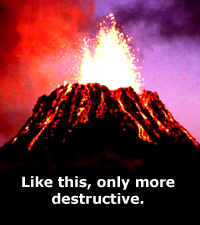The price of oil is going up. Way up. In fact, it looks like it’s going to cost us the whole Gulf Coast.
Don’t know if you heard this story on NPR, but apparently the oil volcano (as Rachel Maddow has been calling it) in the Gulf may be spewing ten times as much crude as BP has been estimating. That’s up to 70,000 barrels a day, according to this analysis. With all the finger-pointing going on between the various overfed corporations involved in engineering this catastrophe, I guess there just hasn’t been enough opportunity to calculate exactly how much toxic sludge is pumped into this vast body of water upon which millions of people – and countless animals – depend. This is almost beyond comment, and it happened before the echo died on Obama’s announcement that he would be opening more offshore areas to oil exploration. As great as that sounded at the time, it’s getting better and better by the day.
 These companies are falling all over themselves trying to limit their liability. Not surprising, but quite honestly, why should they be allowed to do anything of the sort? Is anyone going to limit the liability of every living thing along the Gulf coast? Can a limit be placed on how much people, birds, fish, an entire ecosystem, in fact, will be allowed to suffer? And what the hell happens when we try to place a limit on how much companies like BP can take in profits? Excess profit taxes always raise cries of socialism, unjust takings, etc. These guys have been making billions hand over fist for the last few years in particular with no limits whatsoever. But liability for a massive catastrophe like this – that can be limited, somehow? Ludicrous beyond belief.
These companies are falling all over themselves trying to limit their liability. Not surprising, but quite honestly, why should they be allowed to do anything of the sort? Is anyone going to limit the liability of every living thing along the Gulf coast? Can a limit be placed on how much people, birds, fish, an entire ecosystem, in fact, will be allowed to suffer? And what the hell happens when we try to place a limit on how much companies like BP can take in profits? Excess profit taxes always raise cries of socialism, unjust takings, etc. These guys have been making billions hand over fist for the last few years in particular with no limits whatsoever. But liability for a massive catastrophe like this – that can be limited, somehow? Ludicrous beyond belief.
The plain fact is, there is nothing these companies can offer that will mitigate the damage done to the Gulf and the coastline and wetlands surrounding it. We will hear all about how much money they’re spending on clean-up. But the lesson of these big spills – and this one is really in a category by itself, since it is still spilling – is that ultimately the damage is permanent. I’m not saying that there’s no hope for minimizing its effects. What I’m suggesting is that, like Exxon in Alaska, these companies will delay, deny, and litigate against any meaningful reparation for years, perhaps decades to come. That is the pattern, and unless our government does something about it, it will play out the same way again.
This is the legacy of decades of deregulation and a cozy relationship between oversight agencies and the polluters they keep watch on. Time for a shake up, big time.
luv u,
jp
